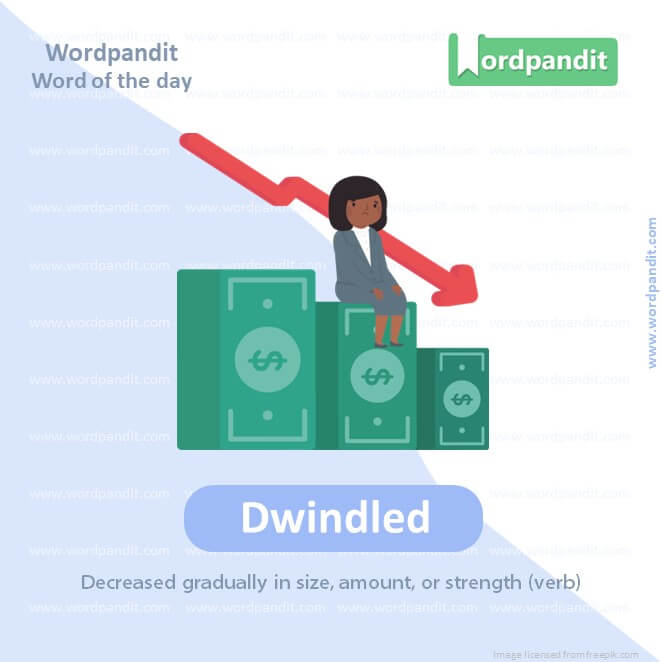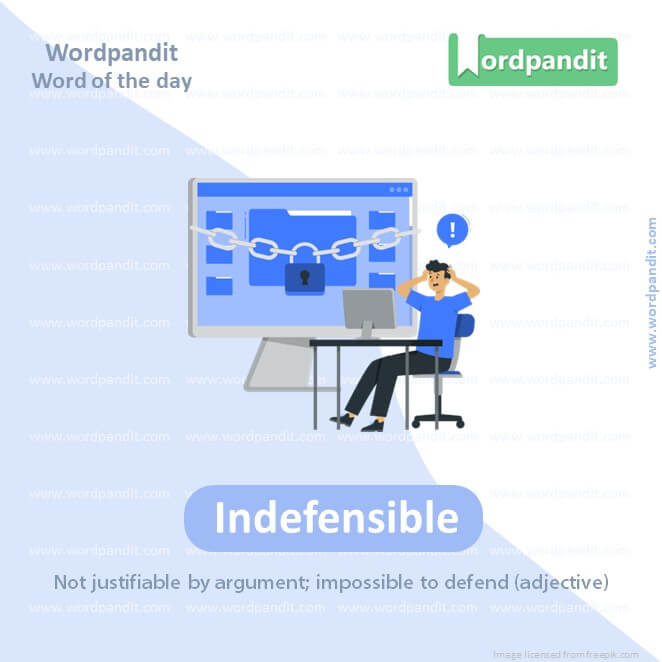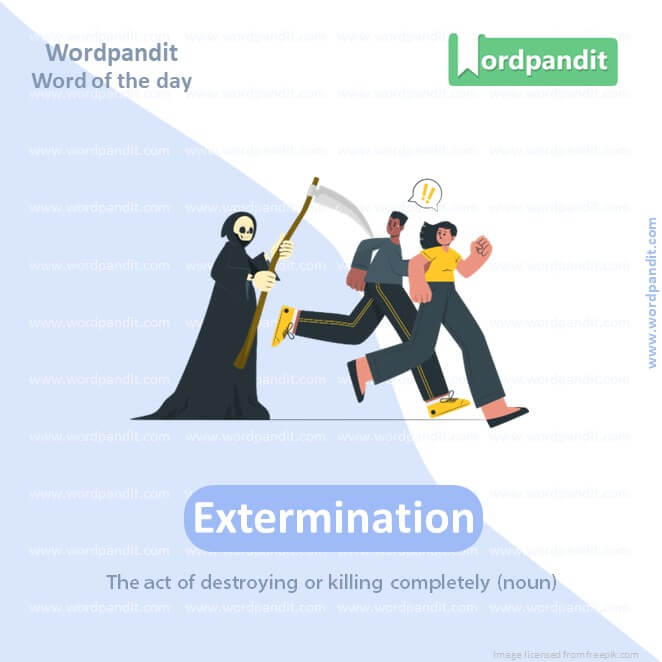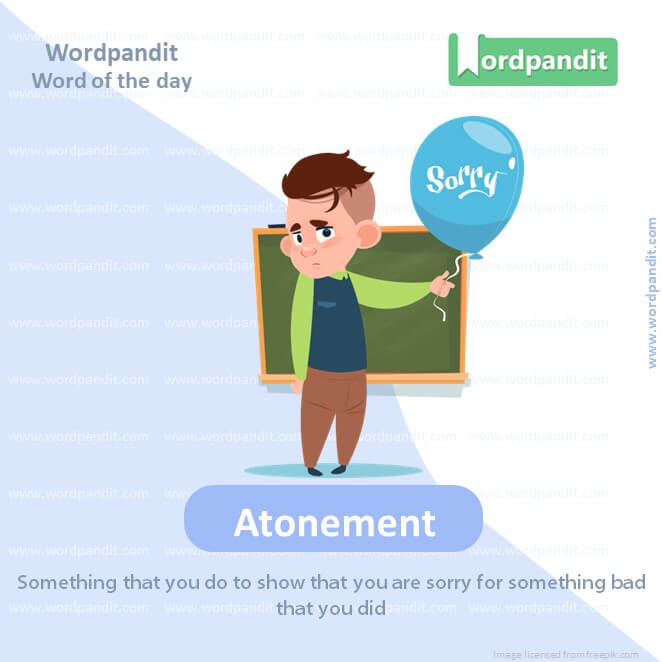Daily Vocabulary Words: Enhance Your Lexicon with Leading Newspapers & Publications
Welcome to the Daily Vocabulary section at Wordpandit!
Our mission is straightforward: to bring you essential vocabulary words featured in top newspapers and publications worldwide. By focusing on words you’ll encounter in renowned sources, we aim to help you enhance your vocabulary effectively and practically.
Our selection includes words from:
– The New York Times
– The Washington Post
– Scientific American
– BBC
– The Guardian
– Psychology Today
– Wall Street Journal
– The Economist
– The Hindu
– The Times of India
– The Economic Times
– Hindustan Times
– Live Mint
– The Indian Express
– And many more.
We are committed to your vocabulary development. Simply visit this section regularly and explore the daily posts. This is your go-to repository for commonly used words, providing significant practical benefits by familiarizing you with vocabulary from the leading publications listed above.
Make it a habit to visit our website daily and expand your lexicon with words from top newspapers and publications.
WORD-1: INGRATIATING
CONTEXT: Stefanik or Senator Tim Scott of South Carolina. He’s pleasant and ingratiating, a tall drink of water.
SOURCE: New York Times
EXPLANATORY PARAGRAPH: Imagine you want someone to like you, so you try really hard to make them happy, maybe by saying nice things or doing something special for them. That’s called being “ingratiating.” It’s when you try to be extra nice so that people will like you.
MEANING: Trying to gain favor or approval by being overly nice or flattering (adjective).
PRONUNCIATION: in-GRAY-shee-ay-ting
SYNONYMS: Flattering, charming, pleasing, fawning, sycophantic
USAGE EXAMPLES:
1. The student’s ingratiating behavior towards the teacher earned him special attention.
2. She used an ingratiating tone to get her way with her boss.
3. His ingratiating smile made everyone suspicious of his true intentions.
4. The ingratiating compliments felt insincere and over the top.
WORD-2: UNSCRUPULOUS
CONTEXT: She’s aggressive and unscrupulous, a triple shot of moonshine.
SOURCE: New York Times
EXPLANATORY PARAGRAPH: Imagine if someone doesn’t care if they hurt others or break the rules to get what they want. That’s called being “unscrupulous.” It’s like not having any sense of what’s right or wrong.
MEANING: Having no moral principles; not honest or fair (adjective).
PRONUNCIATION: un-SKROO-pyu-lus
SYNONYMS: Dishonest, unethical, immoral, corrupt, deceitful
USAGE EXAMPLES:
1. The unscrupulous businessman lied to his clients to make more money.
2. Her unscrupulous actions hurt many people, but she didn’t seem to care.
3. Unscrupulous practices in the company led to legal troubles.
4. The unscrupulous dealer sold fake goods to unsuspecting customers.
WORD-3: UNCHURCHED
CONTEXT: All of those things are lacking in New Hampshire. We are a very unchurched state as a whole.
SOURCE: New York Times
EXPLANATORY PARAGRAPH: Think of someone who doesn’t go to church or belong to a religious community. That person is called “unchurched.” It’s just a word to describe people who aren’t connected to any church.
MEANING: Not belonging to or involved with a church or religious organization (adjective).
PRONUNCIATION: un-CHURCH-ed
SYNONYMS: Nonreligious, secular, irreligious, nonbeliever, unaffiliated
USAGE EXAMPLES:
1. The unchurched population in the town has been growing over the years.
2. She was raised unchurched but found her faith later in life.
3. The organization reached out to both churched and unchurched individuals.
4. Many unchurched families celebrated the holidays in their own way.
WORD-4: DELEGITIMIZING
CONTEXT: They have been kept as perpetual refugees as a means of both delegitimizing…
SOURCE: New York Times
EXPLANATORY PARAGRAPH: Imagine if someone tries to make something seem not real or not important. That’s called “delegitimizing.” It’s like saying, “This doesn’t matter,” or “This isn’t true,” even when it might be.
MEANING: To make something or someone appear less valid, real, or legitimate (verb).
PRONUNCIATION: dee-li-JIT-uh-my-zing
SYNONYMS: Discrediting, undermining, invalidating, questioning, devaluing
USAGE EXAMPLES:
1. The politician tried delegitimizing his opponent’s achievements.
2. The media’s constant criticism was seen as an attempt at delegitimizing the movement.
3. By spreading false rumors, they were delegitimizing her hard work.
4. The tactic of delegitimizing the election results caused widespread controversy.
WORD-5: CUDGELS
CONTEXT: They should not be cudgels in a never-ending struggle, subsidized from one aggrieved generation to the next by international largess.
SOURCE: New York Times
EXPLANATORY PARAGRAPH: Imagine a strong stick that someone might use to protect themselves or to fight with. That’s called a “cudgel.” It’s like a simple, heavy stick that can be used as a weapon.
MEANING: A short, thick stick used as a weapon (noun). / To hit someone with a short, thick stick (verb).
PRONUNCIATION: KUH-juls
SYNONYMS: Club, bat, truncheon, baton, bludgeon
USAGE EXAMPLES:
1. The guard carried a cudgel for protection.
2. In the old days, people used cudgels in street fights.
3. He raised his cudgel, ready to defend himself.
4. The gang members were armed with cudgels and ready for trouble.

WORD-6: DWINDLED
CONTEXT: Ms. Haley’s hopes have now dwindled to a thin thread after her loss in New Hampshire.
SOURCE: New York Times
EXPLANATORY PARAGRAPH: Imagine you have a big pile of candy, but you eat one piece at a time, and soon, there’s only a little left. That’s what happens when something “dwindles.” It means it gets smaller and smaller over time.
MEANING: Decreased gradually in size, amount, or strength (verb)
PRONUNCIATION: DWIN-duld
SYNONYMS: Decreased, diminished, shrunk, lessened, reduced
USAGE EXAMPLES:
1. The crowd dwindled as the concert came to an end.
2. His savings dwindled after months of unemployment.
3. The supply of food dwindled as the winter dragged on.
4. Over the years, the population of the small town dwindled.

WORD-7: CREDENCE
CONTEXT: A large majority of the non-incumbent candidates whom Mr. Trump endorsed aligned themselves closely with his favored causes and gave credence to his conspiracy theories.
SOURCE: New York Times
EXPLANATORY PARAGRAPH: Imagine you hear a story, and you believe it because it sounds true. That’s called giving “credence” to the story. It means believing that something is true or real.
MEANING: Belief in or acceptance of something as true (noun)
PRONUNCIATION: KREE-dens
SYNONYMS: Belief, trust, confidence, faith, acceptance
USAGE EXAMPLES:
1. The scientist’s research gave credence to the theory.
2. No one gave credence to the wild rumors.
3. Her testimony lent credence to the accusations.
4. The evidence added credence to his story.

WORD-8: INDEFENSIBLE
CONTEXT: It was “indefensible to continue offering lawful permanent residence to more than one million foreign nationals every year.”
SOURCE: New York Times
EXPLANATORY PARAGRAPH: Imagine if you did something wrong and there’s no way to explain or protect what you did. That’s called being “indefensible.” It means something can’t be defended or justified.
MEANING: Not justifiable by argument: impossible to defend (adjective)
PRONUNCIATION: in-de-FEN-suh-bul
SYNONYMS: Unjustifiable, inexcusable, unforgivable, untenable, wrong
USAGE EXAMPLES:
1. His actions were indefensible, and he knew it.
2. The company’s behavior was deemed indefensible by the public.
3. The decision to cut funding for the school was indefensible.
4. Her mistake was so serious that it was simply indefensible.

WORD-9: EXTERMINATION
CONTEXT: Government-funded extermination programs incentivized the killing of wolves, largely as a project of “civilizing” the wilderness, an offshoot of Manifest Destiny.
SOURCE: New York Times
EXPLANATORY PARAGRAPH: Imagine getting rid of something completely, like bugs in a house. That’s called “extermination.” It means to make sure there’s nothing left of whatever you’re getting rid of.
MEANING: The act of destroying or killing completely (noun)
PRONUNCIATION: eks-ter-muh-NAY-shun
SYNONYMS: Annihilation, eradication, elimination, destruction, extinction
USAGE EXAMPLES:
1. The extermination of pests in the house took several days.
2. The extermination of certain animal species is a serious environmental issue.
3. The city organized the extermination of rats in the old buildings.
4. Historical events often involve the tragic extermination of entire communities.

WORD-10: ATONEMENT
CONTEXT: One portion of the country saw a chance for atonement for a desecrated wilderness and the promise of a restored ecosystem.
SOURCE: New York Times
EXPLANATORY PARAGRAPH: Imagine you did something wrong, like breaking your friend’s toy, and then you try to make it right by saying sorry or giving them a new toy. That’s called “atonement.” It’s when you try to fix a mistake you made.
MEANING: Something that you do to show that you are sorry for something bad that you did
PRONUNCIATION: uh-TONE-ment
SYNONYMS: Reconciliation, amends, repentance, apology, redemption
USAGE EXAMPLES:
1. He sought atonement for his mistakes by helping others.
2. The movie is about a man’s journey of atonement after a terrible accident.
3. She offered atonement by volunteering at the charity.
4. The ritual was a form of atonement for the villagers.
Vocabulary Importance
In the realm of language learning, understanding ‘vocabulary importance’ is a fundamental concept. Words are the building blocks of language and a rich vocabulary fuels effective and persuasive communication. However, embracing ‘vocabulary importance’ involves more than just acknowledging its role – it requires you to integrate it into your learning strategy.
To truly grasp ‘vocabulary importance’, expose yourself to a variety of reading and listening activities. Whether it’s reading novels, engaging with podcasts, or watching films in your the profound impact of having a robust vocabulary arsenal and will illuminate the practical ‘vocabulary importance.’
Additionally, recognizing ‘vocabulary importance’ necessitates an active approach to vocabulary acquisition. Regularly dedicate time to learning new words. Use flashcards, word lists, language apps, or even set a ‘word of the day’ to maintain a steady flow of vocabulary learning.
Incorporating the learnt vocabulary into your speech and writing is non-negotiable when understanding ‘vocabulary importance’. Regular usage not only enhances vocabulary retention, but it also uncovers the magic of eloquent expression that a blossoming vocabulary can yield.
It’s also beneficial to lean on memory aids in recognizing ‘vocabulary importance’. Associating words with images, stories or personal anecdotes creates strong memory hooks, enhancing vocabulary recall and solidifying the understanding of ‘vocabulary importance’.
To sum it up, ‘vocabulary importance’ is not just a theory to be noted, but a mantra to be embraced in your language learning journey. Engage with a wide variety of resources, actively learn and use new words, and utilize effective recall techniques. As you uncover the depths of ‘vocabulary importance’, you’ll realize that every new word is a fresh shade on your language palette, painting your communication canvas with hues of eloquence, clarity, and confidence.











